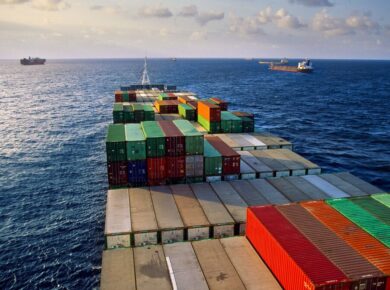Non-oil economy in Dubai remains resilient after experiencing the highest output growth in four months.

Dubai’s non-oil private sector economy continued to expand last month as output growth reached its highest rate in four months. According to S&P Global purchasing managers’ index reading, business activity in Dubai’s economy showed a reading of 54.1 in February, down from 54.5 in January, yet still well above the neutral 50 level. The reading is indicative of a robust performance for Dubai’s non-oil sector as new orders and activity continue to rise sharply.
David Owen, a senior economist at S&P Global Market Intelligence, noted that the pace may have slowed, but output growth remained well above the survey trend. He added that businesses attributed output increases to new clients and continuing projects.
Construction activity in Dubai’s economy registered its strongest upturn since June 2019. Meanwhile, the wholesale and retail, travel and tourism sectors all registered faster increases in activity, compared with January.
Dubai’s economy expanded by 4.6% on an annual basis in the first nine months of 2022. Wholesale and retail trade accounted for 24.1% of its gross domestic product, according to data from the emirate’s statistics centre. Emirates NBD estimates Dubai’s full-year 2022 growth at 5% and expects the emirate’s GDP to grow by 3.5% in 2023.
The tourism sector is a key component of the emirate’s economy and has made a strong rebound from the coronavirus-induced slowdown. Dubai hosted 11.4 million overnight international visitors in the first 10 months of the year, up 134% from the same period in 2021, according to government statistics. The property market also had a record-breaking year, with further price increases registered in December.
Despite rising expenses, companies reduced their output charges to support demand conditions, with costs falling for the seventh month running, although the rate of reduction was modest and the softest since last November.
Non-oil businesses in Dubai benefited from an improvement in supplier delivery times, which picked up to hit their highest level since August 2019. Panellists were also broadly more confident about future activity, with the degree of optimism concerning the next 12 months at its highest since June. They are optimistic that improving market conditions will support higher activity, according to the survey.
“Businesses were also more optimistic … reflecting confidence that demand conditions will continue to improve and avoid disruption from a weaker global economic climate,” said Mr Owen.
Dubai’s government has implemented several initiatives to boost the economy. The city has a diversified economy and has positioned itself as a hub for tourism, trade and finance. Dubai aims to attract a significant amount of foreign investment, increase tourism, and reduce its reliance on oil revenue. The government also plans to attract global companies to establish a presence in the emirate by offering tax exemptions, among other incentives.
Dubai’s economy has been recovering since the COVID-19 pandemic began, with its non-oil private sector economy showing strong signs of growth. The UAE has also implemented measures to encourage economic growth, such as implementing visa reforms, attracting foreign investment and expanding its free trade zones. These measures have helped to increase economic activity, and the country’s economy is expected to grow in the coming years.
Dubai’s non-oil private sector economy has shown signs of growth, with output expansion hitting its highest rate in four months. The construction, wholesale and retail, and travel and tourism sectors all registered faster increases in activity. Companies have reduced their output charges to support demand conditions, and costs have fallen for the seventh month running. Dubai’s government has implemented several initiatives to boost the economy, and the city has positioned itself as a hub for tourism, trade and finance. The UAE has implemented measures to encourage economic growth, which is expected to increase economic activity.





tko disposable thc vape
… [Trackback]
[…] Read More on that Topic: ceoweeklyuae.com/non-oil-economy-in-dubai-remains-resilient-after-experiencing-the-highest-output-growth-in-four-months/ […]
December 17, 2024รับจัดงานศพ
… [Trackback]
[…] Read More to that Topic: ceoweeklyuae.com/non-oil-economy-in-dubai-remains-resilient-after-experiencing-the-highest-output-growth-in-four-months/ […]
January 3, 2025ออกแบบเสื้อยืด
… [Trackback]
[…] Info to that Topic: ceoweeklyuae.com/non-oil-economy-in-dubai-remains-resilient-after-experiencing-the-highest-output-growth-in-four-months/ […]
January 8, 2025แทงหวยกับ UK89Bet
… [Trackback]
[…] Info to that Topic: ceoweeklyuae.com/non-oil-economy-in-dubai-remains-resilient-after-experiencing-the-highest-output-growth-in-four-months/ […]
January 24, 2025HArmonyCa
… [Trackback]
[…] Find More Information here to that Topic: ceoweeklyuae.com/non-oil-economy-in-dubai-remains-resilient-after-experiencing-the-highest-output-growth-in-four-months/ […]
February 5, 2025sagame
… [Trackback]
[…] Find More Info here on that Topic: ceoweeklyuae.com/non-oil-economy-in-dubai-remains-resilient-after-experiencing-the-highest-output-growth-in-four-months/ […]
February 20, 2025Lowara distributor water pump
… [Trackback]
[…] Find More here to that Topic: ceoweeklyuae.com/non-oil-economy-in-dubai-remains-resilient-after-experiencing-the-highest-output-growth-in-four-months/ […]
March 1, 2025Chicken Road
… [Trackback]
[…] Read More on that Topic: ceoweeklyuae.com/non-oil-economy-in-dubai-remains-resilient-after-experiencing-the-highest-output-growth-in-four-months/ […]
March 12, 2025Mostbet
… [Trackback]
[…] Read More on on that Topic: ceoweeklyuae.com/non-oil-economy-in-dubai-remains-resilient-after-experiencing-the-highest-output-growth-in-four-months/ […]
March 18, 2025akbet ทางเข้า
… [Trackback]
[…] Read More on on that Topic: ceoweeklyuae.com/non-oil-economy-in-dubai-remains-resilient-after-experiencing-the-highest-output-growth-in-four-months/ […]
March 18, 2025big bass splash
… [Trackback]
[…] Read More on to that Topic: ceoweeklyuae.com/non-oil-economy-in-dubai-remains-resilient-after-experiencing-the-highest-output-growth-in-four-months/ […]
March 21, 2025สล็อตเว็บใหญ่ รวมทุกค่าย
… [Trackback]
[…] Read More Info here to that Topic: ceoweeklyuae.com/non-oil-economy-in-dubai-remains-resilient-after-experiencing-the-highest-output-growth-in-four-months/ […]
April 9, 2025BAU in Diyala
… [Trackback]
[…] Read More Info here to that Topic: ceoweeklyuae.com/non-oil-economy-in-dubai-remains-resilient-after-experiencing-the-highest-output-growth-in-four-months/ […]
April 13, 2025เช่าเครื่องสเลอปี้
… [Trackback]
[…] Find More on that Topic: ceoweeklyuae.com/non-oil-economy-in-dubai-remains-resilient-after-experiencing-the-highest-output-growth-in-four-months/ […]
April 26, 2025